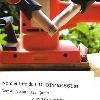 Quellet’s approach to musique concrete and sound manipulation pays careful homage to the likes of Pierre Schaeffer and Luc Ferrari but Quellet's own mark remains distinct. His work has its own voice despite the weight of history that he is composing against. It is nice to hear a fresh take on what has become a stodgy and uninspired field of music; he clearly has a lot of talent and a good ear for sound.
Quellet’s approach to musique concrete and sound manipulation pays careful homage to the likes of Pierre Schaeffer and Luc Ferrari but Quellet's own mark remains distinct. His work has its own voice despite the weight of history that he is composing against. It is nice to hear a fresh take on what has become a stodgy and uninspired field of music; he clearly has a lot of talent and a good ear for sound.
Sub Rosa
Quellet assembles his music from processed loops made by hitting all and everything around him, from a selection of drums to storage tanks and various household items. Most of the time he pumps up the levels on his loops to saturate the recordings, causing the beats to bleed into each other unrecognisably, only the rhythm being preserved. The resulting sounds are somewhat hackneyed; anyone who has ever listened to an oversaturated bootleg recording of any loud concert will be familiar with the sound of saturation. However, Quellet's arrangements easily overcome the staleness of the sounds. He repeats the rhythms with little to no variation within each piece; they become captivating by sheer act of determination on his part. On "Pour percussions et saturation, bruits de gorge," he records abstract vocalisations from his throat and overlays them on the grinding percussion track. The end result being an ominous and atmospheric piece that sounds like so much more than overdriven percussion and a voice.
Considering the abrasive nature of many of the sounds utilised by Quellet, Oppressum is remarkably listenable. There is a dark humour to his work, the repeating farmyard animal sounds on "Pour percussions, jouets sonores" sound both ridiculous and disturbing when the low, menacing throb in the background is factored in. As the piece progresses, Quellet's processing adds a vicious edge to the electronic farmyard toys, ending up as an apocalyptic version of Orwell's Animal Farm. The queasy laughter on "Pour voix et rire, percussions, orgue" also generates a feeling of absurd danger. At first it seems silly but the barrage of laughing takes on a hideous and manic tone as the piece goes on. This piece and the one involving the animal sounds above both highlight Quellet's skill at taking seemingly innocuous sounds and turning them on their head, which for me is one of the basic tenets of musique concrete.
Quellet demonstrates on Oppressum just how much can be done with a few microphones and some inspiration. The range of sounds from a few household items, voice and a church organ is boggling. All the more impressive is the deft way in which Quellet assembles these sounds into pieces of music. Considering this is the start of his recording career, it will be interesting to see what future releases will contain as his skills become more refined. Even if he never releases another sound, Oppressum is still a powerful and evocative release worthy of any of the greats of musique concrête.
samples:
- Pour percussions, jouets sonores
- Pour voix et rire, percussions, orgue
- Pour percussions, ponceuse, frappes sur clavier de téléphone
Read More

